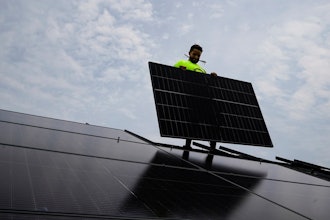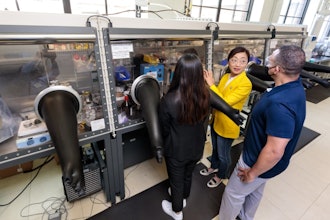NEW DELHI (AP) -- India is increasing safety features at all of its nuclear power plants to try to prevent a crisis like Japan's caused by seismic activity or an extended power loss, a government official said Thursday.
Assessors who inspected India's 20 nuclear power plants found the structures had adequate capability to handle severe natural events, such as earthquakes or tsunamis, said Shreyans K. Jain, chairman of Nuclear Power Corporation of India LTD.
The state-run corporation operates all of India's nuclear power plants, including two boiling water reactors similar to the Fukushima Dai-ichi reactors crippled by last month's earthquake and tsunami.
The recommendations made after the inspections include: augmenting water supplies for cooling; inerting the primary containment with nitrogen; installing new technologies to ensure automatic shutdowns in case of a major earthquake and providing an alert mechanism for tsunamis.
"Additional shore protection measures are also being undertaken, which will absorb considerable energy from tsunami waves," Jain said in a statement.
At least six units at two of India's nuclear power stations would be at tsunami risk.
Since power outages occur frequently in India, all the country's nuclear plants have backup arrangements to offset extended power losses, Indian nuclear scientists say.
The government's plan to spend $175 billion on nuclear power generation by 2030 has made India the world's second-fastest-growing nuclear industry and attracted major producers.
While the Fukushima disaster has many in India questioning the wisdom of building new plants, the government is going ahead, insisting they are urgently needed to power the country's galloping economic growth.
A landmark civilian nuclear deal with the United States, signed in 2008, ended three decades of Indian atomic isolation, with New Delhi gaining access to nuclear technology it had been denied since conducting its first nuclear explosion in 1974.
The 45-nation Nuclear Suppliers Group later lifted a three-decade global ban on nuclear trade with India.
Since then, nuclear power companies have been quick to move in.
France's Areva, the world's largest nuclear supplier, signed a $9.3 billion deal in December with India. India has also signed agreements with Russia to build nuclear reactors. Many other players are waiting to tap into India's vast nuclear energy market.
At present, nuclear energy forms only 3 percent of power available in India.
Assessors who inspected India's 20 nuclear power plants found the structures had adequate capability to handle severe natural events, such as earthquakes or tsunamis, said Shreyans K. Jain, chairman of Nuclear Power Corporation of India LTD.
The state-run corporation operates all of India's nuclear power plants, including two boiling water reactors similar to the Fukushima Dai-ichi reactors crippled by last month's earthquake and tsunami.
The recommendations made after the inspections include: augmenting water supplies for cooling; inerting the primary containment with nitrogen; installing new technologies to ensure automatic shutdowns in case of a major earthquake and providing an alert mechanism for tsunamis.
"Additional shore protection measures are also being undertaken, which will absorb considerable energy from tsunami waves," Jain said in a statement.
At least six units at two of India's nuclear power stations would be at tsunami risk.
Since power outages occur frequently in India, all the country's nuclear plants have backup arrangements to offset extended power losses, Indian nuclear scientists say.
The government's plan to spend $175 billion on nuclear power generation by 2030 has made India the world's second-fastest-growing nuclear industry and attracted major producers.
While the Fukushima disaster has many in India questioning the wisdom of building new plants, the government is going ahead, insisting they are urgently needed to power the country's galloping economic growth.
A landmark civilian nuclear deal with the United States, signed in 2008, ended three decades of Indian atomic isolation, with New Delhi gaining access to nuclear technology it had been denied since conducting its first nuclear explosion in 1974.
The 45-nation Nuclear Suppliers Group later lifted a three-decade global ban on nuclear trade with India.
Since then, nuclear power companies have been quick to move in.
France's Areva, the world's largest nuclear supplier, signed a $9.3 billion deal in December with India. India has also signed agreements with Russia to build nuclear reactors. Many other players are waiting to tap into India's vast nuclear energy market.
At present, nuclear energy forms only 3 percent of power available in India.






















